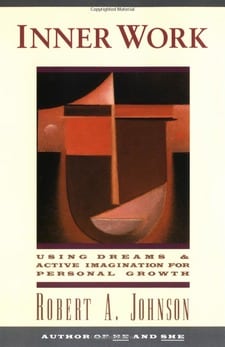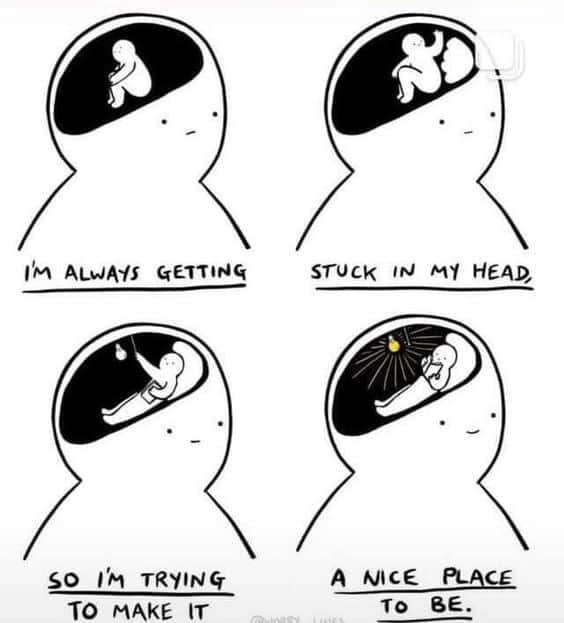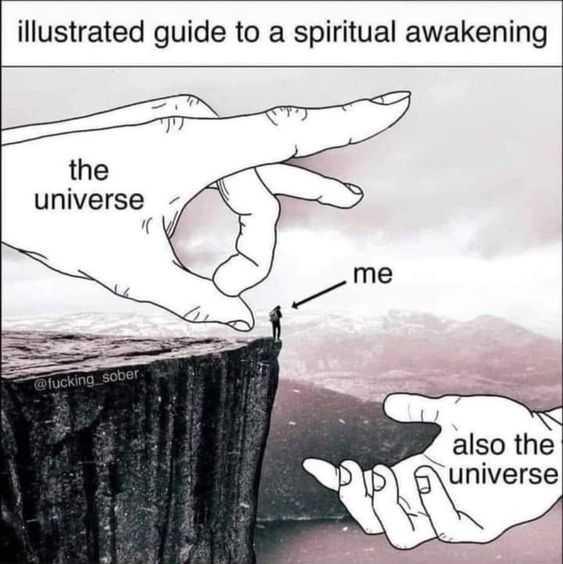“It is in [the] exchange between the ego and the various characters who rise up from the unconscious and appear in my imagination that I begin to bind the fragmented pieces of myself into a unity. I begin to know, and learn from, the parts of myself I had never known before.”
Robert A. Johnson, Inner Work (Page 26)
“Our culture in the twentieth century has a tremendous collective prejudice against the imagination. It is reflected in the things people say: ‘You are only imagining things,’ or, ‘That is only your fantasy, not reality.’ In fact, no one ‘makes up’ anything in the imagination. The material that appears in the imagination has to originate in the unconscious. Imagination, properly understood, is a channel through which this material flows to the conscious mind. To be even more accurate, imagination is a transformer that converts the invisible material into images the conscious mind can perceive.”
Robert A. Johnson, Inner Work (Page 22)
“Each dream communicates information that isn’t know consciously by the dreamer. It therefore takes some real effort, some stretching of our capacities, to get a hold on what the dream is saying. If the interpretation comes too easily, it is not likely to be as accurate or as deep.”
Robert A. Johnson, Inner Work (Page 15)
“Jung observed that the aboriginal people of Australia spend two-thirds of their waking lives in some form of inner work. They do religious ceremony, discuss and interpret their dreams, make spirit quests, ‘go walkabout.’ All this consistent effort is devoted to the inner life, to the realm of dreams, totems, and spirits—that is, to making contact with the unconscious. We modern people can scarcely get a few hours free in an entire week to devote to the inner world. This is why, for all our technology, we may know less of our souls and less of God than seemingly primitive people do.”
Robert A. Johnson, Inner Work (Page 14)
“The more one faces the unconscious and makes a synthesis between its contents and what is in the conscious mind, the more one derives a sense of one’s unique individuality.”
Robert A. Johnson, Inner Work (Page 11)
“Every person must live the inner life in one form or another. Consciously or unconsciously, voluntarily or involuntarily, the inner world will claim us and exact its dues. If we go to that realm consciously, it is by our inner work: our prayers, meditations, dream work, ceremonies, and Active Imagination. If we try to ignore the inner world, as most of us do, the unconscious will find its way into our lives through pathology: our psychosomatic symptoms, compulsions, depressions, and neuroses.”
Robert A. Johnson, Inner Work (Page 10)
“If we don’t go to the spirit, the spirit comes to us as neurosis.”
Robert A. Johnson, Inner Work (Page 10)
“In modern Western society we have reached a point at which we try to get by without acknowledging the inner life at all. We act as though there were no unconscious, no realm of the soul, as though we could live full lives by fixating ourselves completely on the external, material world. We try to deal with all the issues of life by external means—making more money, getting more power, starting a love affair, or ‘accomplishing something’ in the material world. But we discover to our surprise that the inner world is a reality that we ultimately have to face.”
Robert A. Johnson, Inner Work (Page 10)
“The disaster that has overtaken the modern world is the complete splitting off of the conscious mind from its roots in the unconscious. All the forms of interaction with the unconscious that nourished our ancestors—dreams, vision, ritual, and religious experience—are largely lost to us, dismissed by the modern mind as primitive or superstitious. Thus in our pride and hubris, our faith in our unassailable reason, we cut ourselves off from our origins in the unconscious and form the from the deepest parts of ourselves.”
Robert A. Johnson, Inner Work (Page 10)
“The purpose of learning to work with the unconscious is not just to resolve our conflicts or deal with our neuroses. We find there a deep source of renewal, growth, strength, and wisdom. We connect with the source of our evolving character; we cooperate with the process whereby we bring the total self together; we learn to tap that rich lode of energy and intelligence that waits within.”
Robert A. Johnson, Inner Work (Page 9)
“Each of us is building a life, building an edifice. Within each person the plan and the basic structure are established in a deep place in the unconscious. But we need to consult the unconscious and cooperate with it in order to realize the full potential that is built into us. And we have to face the challenges and painful changes that the process of inner growth always brings.”
Robert A. Johnson, Inner Work (Page 7)
“The unconscious manifests itself through a language of symbols. It is not only in our involuntary or compulsive behavior that we can see the unconscious. It has two natural pathways for bridging the gap and speaking to the conscious mind: One is by dreams; the other is through the imagination. Both of these are highly refined channels of communication that the psyche has developed so that the unconscious and conscious levels may speak to one another and work together.”
Robert A. Johnson, Inner Work (Page 4)
Inner Work [Book]
Book Overview: A practical four-step approach to using dreams and the imagination for a journey of inner transformation. In Inner Work, the renowned Jungian analyst offers a powerful and direct way to approach the inner world of the unconscious, often resulting in a central transformative experience. A repackaged classic by a major name in the field, Robert Johnson’s Inner Work enables us to find extraordinary strengths and resources in the hidden depths of our own subconscious.
Post(s) Inspired by this Book:
37 Robert A. Johnson Quotes from Inner Work To Convince You Dreams Aren’t Arbitrary
“Dig inside yourself. Inside there is a spring of goodness ready to gush at any moment, if you keep digging.”
Marcus Aurelius, Meditations (Page 67)
“I had always seen the world as my battlefield; I now understood that the true combat zone was my mind.”
Will Smith, Will (Page 394)
“I like making friends, I thought. I began trying to listen to and observe what was going on in my head, and a painful realization washed across me: I wasn’t enjoying being with myself. In fact, I wanted to get away from myself as fast as I could. And it dawned on me, If I don’t want to be with me, why the fuck would anybody else wanna be with me?”
Will Smith, Will (Page 375)




